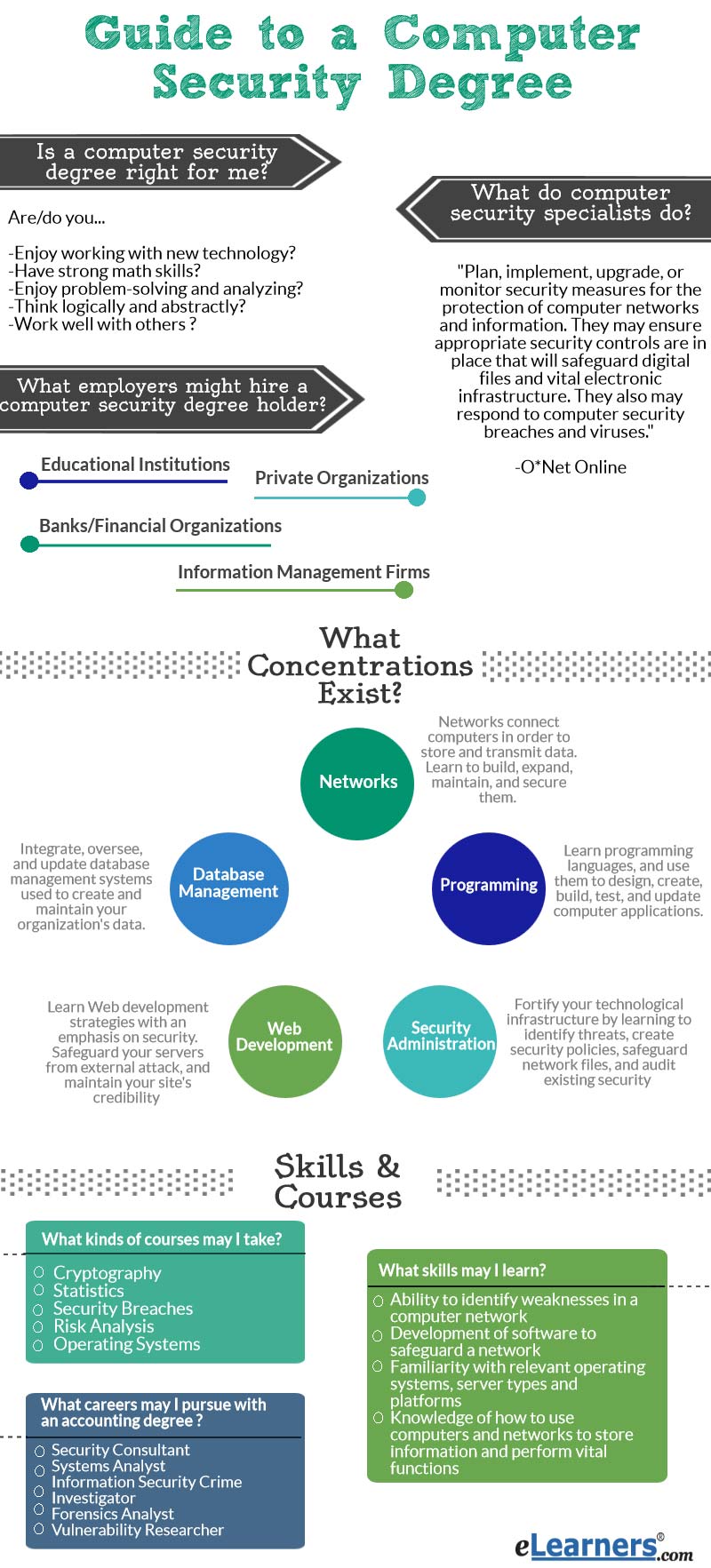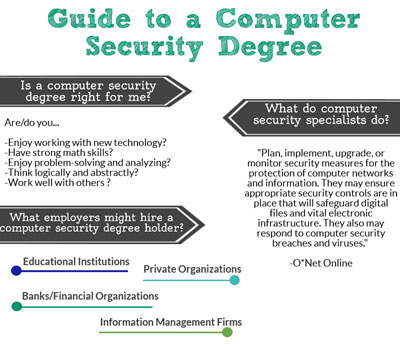
Sponsored Online Programs Available
All About an Online Cyber Security Degree
If you are thinking about pursuing an online cyber security degree, you should understand what cyber security is first. Cyber security mainly consists of securing computers and networks from malicious attacks, viruses, worms, trojans, and malware.
Those with a cyber security degree, may protect organizations against cyberthreats that could compromise sensitive information or, at worst, harm clients by exposing their identities, password-protected materials or other intelligence. As the world becomes increasingly reliant on technology and the already broad realm of computer technologies becomes even more expansive, the responsibilities of information security analysts constantly grow, according to the U.S. Bureau of Labor Statistics.[i]
With that in mind, individuals interested in tech security may want to get involved in the industry by earning a computer security degree. This degree may teach you about the essential programs involved in the field and possibly help open doorways to valuable programs that may give you more tech experience.
To become an information security analyst, the BLS claims that a bachelor's degree in a computer-related field and additional work-related experience is often required.[i] To begin your journey, pursue an online degree to get a broader and more specialized sense of computer security.
What are some of the courses offered as part of an online cyber security degree program?
Cyber security students don't just learn how computers work. They also learn how to protect the information within a computer or a computer network system. Courses in inforamtion security may include:
- Principles of Programming
- Mathematical Logic
- Statistics
- Calculus
- Fundamentals of Computer Security
- Introductory Algorithm Analysis
- Cryptography
- Network Security
- Operating Systems
- Computer Concepts and Applications
- Legal and Ethical Issues
- Linear Data Systems
- Computer Science Fundamentals
- Networking and Data Communications
- Systems Design
- Risk Analysis
- Security Breaches
- Software Engineering
- Advanced Programming and Algorithms
- Database Management
What skills might I learn from an online cyber security degree program?
The skills you learn while earning your cyber security degree will vary according to your concentration, but these are the skills and competencies that may be cyber security majors:
- Knowledge of how to use computers and networks to store information, perform vital functions, and remain competitive with other businesses in your market
- Ability to identify weaknesses in a computer network
- Development of software to safeguard a network's vulnerabilities
- Familiarity with all relevant operating systems, server types, and platforms
- Ability to ensure that computer systems run smoothly without interference from malicious software or hackers
- Knowledge or familiarity with relevant programming languages
- Capability of working with law enforcement to investigate computer crimes such as identity theft, "white collar crimes," or cyber-terrorism
- An understanding of business and management principles
How can I specialize my information security degree?
Information security is a concentration in and of itself. However, some college programs offer more specific concentrations within the information security field. If you want to graduate with a highly-focused specialization, here are a few common subfields worth exploring:
Networks: Networks connect computers in order to store and transmit data. Learn to build, expand, maintain, and secure them.
Security Administration: Fortify your technological infrastructure by learning to identify threats, create security policies, safeguard network files, and audit existing security procedures.
Web Development: Learn Web development strategies with an emphasis on security. Safeguard your servers from external attack, and maintain your site's credibility by securing your visitors' pages.
Is an online cyber security degree right for me?
Think about an online cyber security degree if you:
- don't panic when you see the "blue screen of death" on your computer
- enjoy working with new technology
- can remember numerous user names and passwords, even though you can't remember your family members' birthdays
- have strong math skills
- think anyone without ironclad virus protection on his or her computer is just asking for it
- think logically and abstractly
- have your own website
- effortlessly crack your mom's e-mail password consisting of her cat's name and birthday
- have an analytical mind
- consider identity theft your worst nightmare
- enjoy problem-solving
Things to Consider When Choosing an online Computer Information Security Degree
In an interconnected global economy where businesses may be subject to cyber threats, there is a growing need to protect information stored and sent by computers. Earning an online computer information security degree could be the first step to jumpstarting your career in information security. If you are interested in pursuing such a degree, there are lots of colleges and not-for-profit schools that offer such a program. Before applying, there are certain things you may want to know.
Accreditation[iv]
While there are many schools offering computer information security degree programs online, it may be wise to look for ones that are accredited by the Computing Accreditation Commission (CAC) of ABET, the accreditor of college and university programs in applied science, computing, engineering and technology. ABET accreditation means that a college or university program meets the standards of today’s computing profession. The ABET accredits programs, not institutions, paying particular attention to post-secondary programs within an accredited college or university.
Preparing to Pursue a Career in Computer Information Security
Once you’re enrolled in an online computer information security degree program, you may learn a variety of skills, including the ability to design an organization’s security systems procedures and protocols and ensuring that an organization’s online security systems are compliant with standards, policies and laws. Employment in the computer and information technology field is projected to grow 12 percent from 2014 to 2024, faster than the average for all other occupations[iv]. You may even want to consider pursuing a career as an information security analyst, a career that is expected to grow 18 percent from 2014 to 2024.[iii]
Helpful Resources
Taking an online computer information security degree program can be very different than traditional on-campus learning. To make it more enjoyable, seek out the valuable resources that lots colleges and schools offer. They may include IT services, tutoring, disability support, online library assistance and the chance to speak to a professor if you need extra help. When signing up for classes, be sure to contact your school’s program representative or counselor to find out where you can access such resources.
Great Student Support
Choosing the ideal college and the right online computer information security program can be a difficult task. That’s why it’s important to know what you may need to look for. While school location, size and campus life may not be as important to an online student as it is to one on campus, there are other factors you should consider. Examining a school’s graduation rate, its retention numbers, its career assistance, along with its loan default rate may all be important. Not all online degree programs may be eligible for federal student aid and not all may be accredited[vi]. Earning an online computer information security degree may be a great way to pursue entry to this growing field as well as opening the door to the career of your dreams.
A glimpse into the realm of computer security
As you may have guessed, those professionals with a computer security degree often work in offices as they do most of their work on a computer. However, where exactly these offices are located varies greatly. Information security professionals are hired by consulting agencies, financial firms, big businesses and more. These tech-savvy professionals can be valuable in virtually any organization that relies on computers to carry out their daily work operations. As the number of companies bringing their services online grows, so does the need for capable information security professionals. Internet threats such as hackers, fraudulent programs and computer bugs can wreak havoc for an unprotected business. It's the information security professional's job to combat these tech problems and keep an organization safe.
Possible salaries after earning a computer security degree
Computer security professionals are part of a very specialized field that requires a great deal of expertise. Workers' salaries depend on a host of factors including relevant experience, place of work and level of skill. Consider the following careers, with statistics compiled by the BLS in 2012.
- Information security analysts: 2012 Median annual salary of $86,170 (37 percent projected growth through 2022)[i]
- Computer and Information Systems Managers: 2012 Median annual salary of $120,950 (15 percent projected growth through 2022)[ii]
- Computer Systems Analysts: 2012 Median annual salary of $79,680 (25 percent projected growth through 2022)[iii]
[i] bls.gov/ooh/computer-and-information-technology/information-security-analysts.htm | [ii] bls.gov/ooh/management/computer-and-information-systems-managers.htmm | [iii] bls.gov/ooh/computer-and-information-technology/computer-systems-analysts.htm | [iv] abet.org/accreditation/ | [v] bls.gov/ooh/computer-and-information-technology/home.htm | [vi] studentaid.ed.gov/sa/prepare-for-college/choosing-schools/consider#statistics



